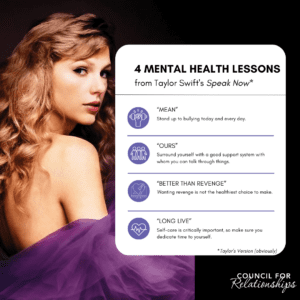4 Mental Health Lessons from Taylor Swift’s Speak Now
We can draw many mental health lessons from Taylor Swift’s vast music catalog. As the songstress rerecords her albums, we reflect on the 4 mental health lessons from Taylor Swift’s Speak Now (Taylor’s Version).
Next Album: Red (Taylor’s Version)
Previous Album: Fearless (Taylor’s Version)

Infographic by Council for Relationships
Important mental health takeaways from Speak Now (Taylor’s Version)
Each song in Speak Now (Taylor’s Version) takes you on a different journey through Swift’s feelings and dives into her emotions. Speak Now (Taylor’s Version) covers love, anger, bullying effects, and self-protection from judgment. These expressions show that people feel unsupported in various areas.
As I type these words, I am contemplating the profound depth of these songs that is not immediately apparent.
Speak Now (Taylor’s Version) Mental Health Lessons
Mental health lesson #1: “Mean (Taylor’s Version)”
This song paints a picture of defending oneself from bullies. Bullies are individuals who intimidate others who appear vulnerable.
In “Mean (Taylor’s Version),” Swift sings, “Calling me out when I’m wounded, you, picking on the weaker man.” Swift says she will live in a busy city someday, where they cannot hurt her feelings anymore. She also emphasizes how they mention her flaws, but she already sees them.
If someone constantly criticizes you and makes you feel bad, remember that they might have their own self-doubts. Their feelings are less about you and more about the person bullying you. If you or someone you know experiences bullying, tell someone about it.
Talking to someone in this situation is extremely important to prevent further damage. Swift’s lyrics demonstrate her empathy towards individuals who have experienced mistreatment and feel compelled to harm others. She wants to assure them that she will end the cycle of bullying and that the cycle of bullying stops with her.
Stand up to bullying today and every day.
Mental health lesson #2: “Ours (Taylor’s Version)”
Swift sets the tone for this song by singing, “People throw rocks at things that shine.” This song paints a picture of jealousy and a distaste for others’ situations because they have different opinions.
If you ever find yourself in a relationship that people do not approve of, ask yourself why they do not approve. Also, evaluate if they should have any reason to make those judgments about your relationship. Someone judging a relationship that has nothing to do with them can cause those individuals great harm. We should accept all love regardless of who it includes.
In this situation, creating healthy boundaries and separating yourself from hate thrown at you is important. To the individuals in the relationship, reframing the narrative can be crucial.
In this situation, it is important to surround yourself with a good support system with whom you can talk through things.
Mental health lesson #3: “Better Than Revenge (Taylor’s Version)”
Swift changed a critical lyric in this song for the 2023 recording of Speak Now.
The original lyric was: “She’s better known for the things that she does on the mattress.” Swift changed this lyric: “He was a moth to a flame // she was holding the matches.”
With this change, it becomes clear that Swift did not want to shame women for their relationships and actions anymore.
It seems that Swift reflected on her thoughts and feelings as an adolescent and decided that she no longer holds the same views. Casting judgment on others can damage a person and their reputation.
This song teaches us that we change a lot in life. This song teaches us that change is a natural part of life.
It also reminds us that our past judgments do not have to define us. It emphasizes the importance of giving ourselves grace and forgiveness. Giving ourselves grace and forgiveness is important.
This song discusses Swift’s urge for revenge when a woman “steals” her partner. In reality, no one can be “stolen” from you. They should get equal blame if they leave a relationship for someone else.
Wanting revenge is not the healthiest choice to make. Reset yourself by walking, showering, or doing breathing exercises to bring you back to the present moment.
Mental health lesson #4: “Long Live (Taylor’s Version)”
This song explains Swift’s focus on her legacy…and also happens to be a personal favorite.
Swift discusses her ongoing challenges and the people on her journey with her. Always reflect on your support systems and consider your appreciation for those beside you.
Thinking about the legacy you would like to leave behind is important. You might consider the following questions:
- What differences do you want to make in the world?
- How can you impact people in positive ways?
- What will make you happy?
Self-care is critically important, so make sure you dedicate time to yourself.

Meghan Rydzewski (pictured here) is a CFR Staff Therapist
About the Author
Meghan Rydzewski, MFT, is a Therapist at the Council for Relationships who sees clients in New Jersey and Pennsylvania. Go to her bio page to ask about the mental health lessons from Taylor Swift’s Speak Now or Meghan’s availability for new clients.
See our Therapist & Psychiatrist Directory to find a different CFR therapist or psychiatrist near you.
More from CFR
Taylor Swift Songs about Mental Health: The Self-Titled Edition
